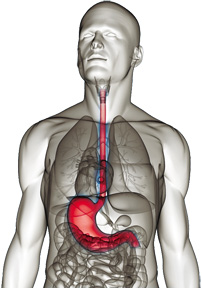How does the stomach acid get turned off? And what can be done about it? The main reason stomach acid gets turned off is from stress caused by high carb intake (high sugar levels are enormously stressful for the body), mental stress, physical stresses like excessive exercise, or physical stresses such as inflammation, infections, anemia or food intolerances.
People who have had gastric bypass surgeries often have the acid-producing part of their stomach removed.
I would estimate that a minimum of 90 percent of the patients I see have reduced stomach acid. These are people with blood sugar issues (that's nearly everyone), with symptoms of gas (especially gas with smell), bloating, "fullness," or with symptoms of acidity, sour stomach or acid reflux. I see people with constipation, or a loss of appetite for meat – this is a classic sign of low stomach acid. I see people who don't eat meat because it "doesn't digest well." Older people lose some of their ability to produce stomach acid, often just when they need it most – to digest protein (to maintain muscle mass) and for vitamins and minerals.
Most people simply need supplementation of digestible betaine hydrochloride (HCI), for three to six months to restore proper acidity to the stomach and eliminate the symptoms they're having.
Mucilaginous vegetables like okra are especially effective for that. The stomach lining heals quite quickly, so after 10 days of eating okra or taking okra pills, you can add in the betaine hydrochloride with each meal. Make sure that it's taken with or right after a meal.
Apple cider vinegar is a popular home remedy for low stomach acid, but it's quite weak. It will help a little, but you might also consider supplementation, because if you are continuing to stress your body in whatever way that you do, the apple cider vinegar might not be enough, and considering how much we need good acid, it might be worthwhile to supplement.
You might also want to limit how much water you consume at a meal. We get served these huge glasses of water and are told to drink large amounts of water during the day, but water will dilute the action of stomach acid, reducing its effectiveness. Some water is OK, but it's best to drink between meals and avoid ice water.
It's not just a matter of fixing the problem once and thinking you're done. Pay attention to symptoms, and ask your doctor about betaine hydrochloride if you start having problems. Anytime you have a large meal, or when you travel, or in periods of high stress, you take it just as a precaution.
You will be amazed at how quickly those acid reflux, sour stomach, and gas problems will be resolved without having to take a lifetime of purple pills when you incorporate these simple, natural strategies. Ask your doctor for more information regarding digestive health.
What Is Acid Indigestion?
 Acid indigestion is defined by medical doctors as excessive secretion of hydrochloric acid by the stomach cells. Sometimes used interchangeably with heartburn. Many of the problems associated with stomach acid are also known as gastroesophageal reflux disease (GERD), peptic esophagitis; reflux esophagitis; heartburn or dyspepsia.
Acid indigestion is defined by medical doctors as excessive secretion of hydrochloric acid by the stomach cells. Sometimes used interchangeably with heartburn. Many of the problems associated with stomach acid are also known as gastroesophageal reflux disease (GERD), peptic esophagitis; reflux esophagitis; heartburn or dyspepsia.
Gastroesophageal reflux disease (GERD) is a condition in which the stomach contents (food or liquid) leak backwards from the stomach into the esophagus (the tube from the mouth to the stomach). This action can irritate the esophagus, causing heartburn and other symptoms.
When you eat, food passes from the throat to the stomach through the esophagus (also called the food pipe or swallowing tube). Once food is in the stomach, a ring of muscle fibers prevents food from moving backward into the esophagus. These muscle fibers are called the lower esophageal sphincter, or LES.
If this sphincter muscle doesn't close well, food, liquid, and stomach acid can leak back into the esophagus. This is called reflux or gastroesophageal reflux. This reflux may cause symptoms, or can even damage the esophagus.
If you are experiencing any of these symptoms, talk to your doctor.
Marlene Merritt, DOM, LAc, is a licensed acupuncturist and runs a wellness center in Austin, Texas. She specializes in Oriental medicine and nutritional protocols.

